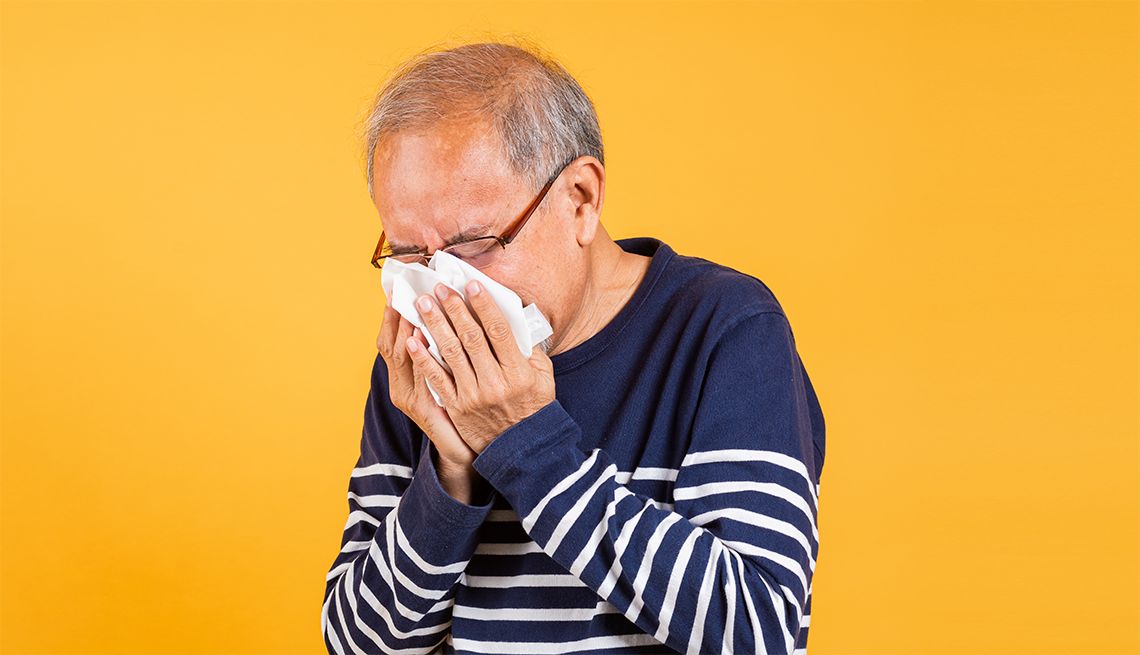AARP Hearing Center


If you’ve been sneezing, itching and wiping away at watery eyes, you are not alone. The Centers for Disease Control and Prevention (CDC) says about a quarter of U.S. adults suffer from seasonal allergies, and interestingly, the burden is more likely to fall on older adults.
While 24.7 percent of adults ages 18 to 44 have seasonal allergies, roughly 28 percent of people 45 to 64 and 26.4 percent of adults ages 65 to 74 experience them, data shows.
If you’re among the pollen-suffering population, you may feel worse this year than you did, say, a decade ago. It’s not all in your head: Allergy seasons are becoming longer and more intense in many areas of the country due to warming temperatures that cause plants to produce pollen earlier in the spring season and keep ragweed around longer in the fall, the Environmental Protection Agency explains. It’s also possible for allergy symptoms to worsen as you age, says Margaret Kuder, M.D., an allergist at the Cleveland Clinic; one reason is immune system changes.
“A lot of times, if people have pollen allergies, it’s not something that starts later in life. Usually, it’s been around in some form throughout most of adulthood and even childhood, and then sometimes, it can get worse as we get into adulthood,” Kuder says.
However, there are a number of things you can do to get some relief this spring. Here are six tips recommended by allergists:
1. Get a nasal spray — and start using it right away.
Kuder says her go-to is an intranasal spray for allergy symptom relief (including eye symptoms), which you can get over the counter. “They work right at the source of where you’re having symptoms, and you don’t have to have that whole body exposure you can have with pills,” she says.
She typically starts patients with an intranasal steroid spray, like fluticasone (Flonase) or triamcinolone (Nasacort), which are low-dose and help to reduce the inflammation from allergies. “And then if the nasal steroids are not giving full relief, a lot of times, we’ll add on intranasal antihistamine spray,” she adds, such as azelastine (Astelin or Astepro).
The trick is to start the steroid sprays early in the season, says J. Allen Meadows, M.D., an allergist at Jackson Hospital in Montgomery, Alabama, and past president of the American College of Allergy, Asthma and Immunology. “They take about 10 days to start working and a month or so to have an actual effect,” he says. “So you’ve got to be faithful and use those every day, but they’re quite effective and really not very expensive at all.”
2. Take an allergy pill.
Don’t have time to wait for the sprays to start working and need relief fast? Over-the-counter oral medications take about an hour to kick in, though Meadows says they are less effective than the sprays. Examples of over-the-counter antihistamines for allergies include loratadine (Claritin), cetirizine (Zyrtec) and fexofenadine (Allegra). Meadows adds that you can usually find the best deals on these medications at wholesale clubs.
If you opt for an antihistamine pill, make sure you’re getting a non-sedating one. First-generation antihistamines such as diphenhydramine (Benadryl) can have a sedating effect and can also make it harder to urinate. Second-generation antihistamines, like the allergy pills listed above, are less likely to cause drowsiness and other side effects, Kuder says.
Some people reach for decongestants like pseudoephedrine (Sudafed) during allergy season to help relieve stuffiness. If you have high blood pressure, talk to your doctor before taking a decongestant since the medication can worsen the condition.
What’s causing my symptoms?
Pollen is the biggest driver of what doctors call allergic rhinitis and conjunctivitis — your runny nose and itchy, watery eyes, Kuder says. Tree pollen levels start to rise in the early spring — birch, cedar, cottonwood and pine are big allergy triggers, according to the American Academy of Allergy, Asthma and Immunology — and then grass pollen picks up a little later in the season.
In the fall, ragweed is often to blame, Meadows adds. Mold can also contribute to symptoms in the spring and fall in some areas. And let’s not forget that pets and pests (especially cockroaches) can trigger allergies, Meadows says.





































































More From AARP
4 Hidden Allergy Triggers
While seasonal allergy triggers may be top of mind this time of year, they aren't the only ones that lead to suffering
Why Older Adults Need a Second COVID Shot
Health officials are recommending at the advice of independent advisers that adults 65 and older get another dose of the COVID-19 vaccine this spring
AARP Smart Guide to Seasonal Allergies
Explore allergist- and research-backed tips for staving off symptoms — and what's best to avoid